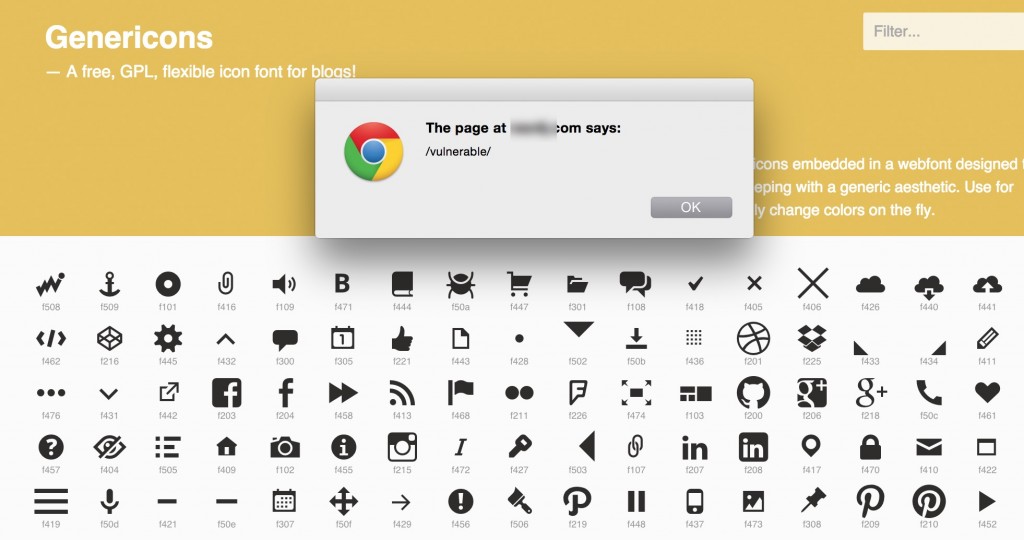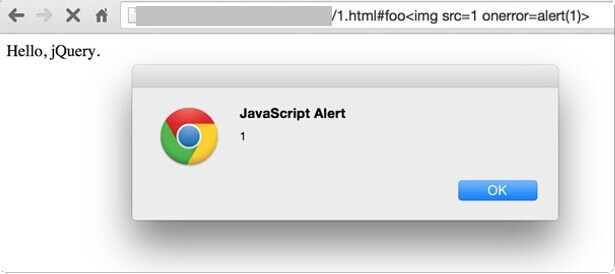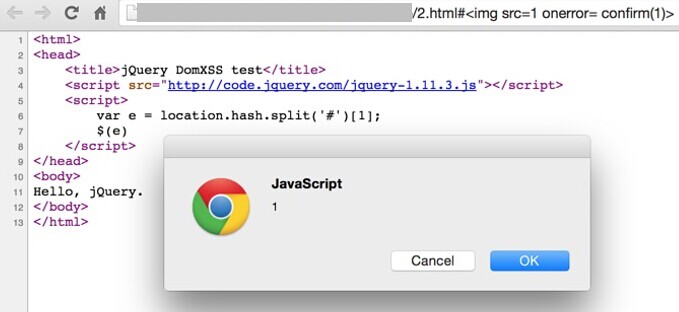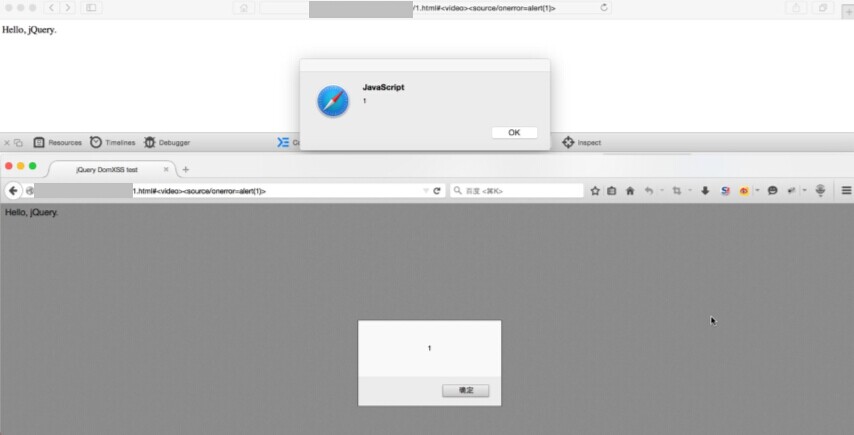WordPress 被爆 DOM XSS 漏洞,数百万站点受影响
知道创宇安全研究团队 Evi1m0 :2015.5.7
概要
WordPress 被爆 DOM XSS 漏洞,数百万站点受影响,该漏洞存在于 WordPress 流行的 Genericons example.html 页面中,默认主题 Twenty Fifteen 及知名插件 Jetpack 都内置了该页面,经过分析发现原来是 example.html 使用了存在 DOM XSS 漏 洞的 jQuery老版本 。
11 年 dmethvin 提交 jQuery 1.6.1 版本的 Ticket #9521 , 其原因是由 $() | jQuery() 预期的 CSS 选择器在其他情况下可以用于创建 HTML 元素,如果编码不当(事实上很多编码不当的情 况),将会导致产生 DomXSS 漏洞。
代码示例(jQuery 1.6.1)
WordPress 默认主题 twentyfifteen 示例
example.html 297-299 lines:
// set permalink
var permalink = cssclass.split(' genericon‐')[1];
window.location.hash = permalink;
console.log permalink:
- http://linux.im/wp-content/themes/twentyfifteen/genericons/example.html#123
- console.log(permalink): genericon-123
335-343 lines:
// pick random icon if no permalink, otherwise go to permalink if ( window.location.hash ) { permalink = "genericon‐" + window.location.hash.split('#')[1];
attr = jQuery( '.' + permalink ).attr( 'alt' );
cssclass = jQuery( '.' + permalink ).attr('class');
displayGlyph( attr, cssclass );
} else {
ccc pickRandomIcon();
}
如果存在 window.location.hash 则拼接 permalink 并使用 jQuery 进行属性操作,问题出现,当我 们将 location.hash 设置为 <img src=@ onerror=alert(1)> 时,导致跨站。
jQuery 1.6.1 源码
>_ $ jquery.js:25 function ( selector, context ) {
// The jQuery object is actually just the init constructor 'enhanced'
return new jQuery.fn.init( selector, context, rootjQuery );
}>_ jQuery.fn.init
jquery.js:93 function ( selector, context, rootjQuery ) {
var match, elem, ret, doc;// Handle $(""), $(null), or $(undefined)
if ( !selector ) {
return this;
}// Handle $(DOMElement)
if ( selector.nodeType ) {
this.context = this[0] = selector;
this.length = 1;
return this;
}
......
if (selector.selector !== undefined) {
this.selector = selector.selector;
this.context = selector.context;
}return jQuery.makeArray( selector, this );
}
其中 jQuery.fn.init :
if ( typeof selector === "string" ) {
// Are we dealing with HTML string or an ID?
if ( selector.charAt(0) === "<" && selector.charAt( selector.length ‐ 1 ) === ">" && selector.length >= 3 ) {
// Assume that strings that start and end with <> are HTML and skip the regex check
match = [ null, selector, null ];
} else {
match = quickExpr.exec( selector );
}
quickExpr 对 selector 进行过滤,正则为:
quickExpr = /^(?:[^<]*(<[\w\W]+>)[^>]*$|#([\w\‐]*)$)/,
显然我们上面的 Payload 是能通过的。
jQuery 1.7.2 源码
当时漏洞报告者在 #9521 中提到修复方案:
the quick patch by jquery is here
‐ quickExpr = /^(?:[^<]*(<[\w\W]+>)[^>]*$|#([\w\‐]*)$)/,
+ quickExpr = /^(?:[^#<]*(<[\w\W]+>)[^>]*$|#([\w\‐]*)$)/,
尽管在开始的示例代码中不能生效,但由于程序开发人员的编码习惯显然按照上面的修复并无效果,修复后原有的攻击代码效果:
>_ location.hash
"#test<img src=1 onerror=alert(1)>">_$(location.hash) []
因为正则新增 # 的原因导致增加失败,在真实环境中属性或其他操作直接使用 location.hash 的 可能性叫小,开发人员以及业务需求使得上面的修复方案没有意义,例如开始提到的 WordPres s Default Themes XSS 漏洞 337 行:
permalink = "genericon‐" + window.location.hash.split('#')[1];
程序将获取到的 hash [‘#test111’] split 后,只保存 test111 ,也就使得我们能忽略到 1.7.2 的修 复。
jQuery 1.11.3 源码
在前面版本中其实能够得以证明 jQuery 团队确实修复 #9521 的问题就是 quickExpr 的上方注 释:
// A simple way to check for HTML strings or ID strings
// Prioritize #id over <tag> to avoid XSS via location.hash (#9521)
quickExpr = /^(?:[^#<]*(<[\w\W]+>)[^>]*$|#([\w\‐]*)$)/,
可能开发团队遇到了 1.7.2 中我提到问题的尴尬窘境,他们在 1.11.3 又对其进行了升级:
rquickExpr = /^(?:#([\w‐]+)|(\w+)|\.([\w‐]+))$/,
看到这个正则我几乎无语,开头使用 < 就能轻易绕过:
终于,他们在 2.x 系列正式修复了这个问题:
rquickExpr = /^(?:#([\w‐]+)|(\w+)|\.([\w‐]+))$/,
其他浏览器
如你所见,上面这些 Payload 并不会在 Safari 中成效,通过调试即可发现 Chrome 未对 locatio n.hash 部分进行 URL 编码处理进入函数,而 Safari 会经过 URL 编码进入函数,是这样的:
但是我们仍然可以使用 html5 的一些特性,引发错误并 onerror 出来:
file:///1.html#<video><source/onerror=alert(1)>





